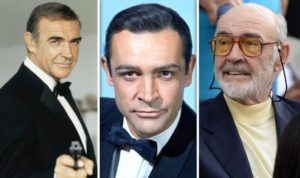Ringside Report Tribute to Sir Sean Connery (1930-2020)
[AdSense-A]
 By Donald “Braveheart” Stewart
By Donald “Braveheart” Stewart
Sir Sean Connery, having now left the stage, is best remembered as an iconic version of his homeland, as a man, like his country of contradictions and presence in equal measure. He was the type of man who made as much of an impact by being absent as being present.
A lifelong Republican, he had a knighthood from the Queen.
A lifelong supporter of independence, he had not lived in Scotland for decades.
A passionate Scot, he became the epitome and the best English hero.
Scotland, that wee country that has given the world so much, salutes him because we too are a country of contradictions.
Connery was born in Edinburgh, the son of a lorry driver and a cleaner; and yet he was to grow to become a cultural icon who performed Shakespeare. His father was Catholic, his mother Protestant; a more fitting example again of our dual soul there could not be.
Affectionately referred to as Big Tam, Connery had an Irish link to the priesthood through his father, whilst a Gaelic mysticism emanated from his mother’s Gaelic speaking family, once again the dual spiritual confusing pathway of a nation.
After leaving school, he went through a range of temporary employment – the Royal Navy, bricklayer, lifeguard, coffin polisher and model – clothed and otherwise – before finding his calling.
And yet it could have all been very different when in the early 1950’s another knighted Scottish legend, the manager of Manchester United, Sir Matt Busby saw him play football and offered him a contract with United. Had he not turned it down he might not have ended up in the West End by 1953 and in celluloid by 1957.
By 1959 his cinematic career really took off when he was plucked from the stage by Walt Disney to appear in the film Little People and his pathway to stardom was set.
1962 then arrived and with it his first outing as the eponymous English hero, James Bond, in Dr. No. It was met with a resounding oh God yes, please by the public. Whilst the author, Ian Fleming, was looking for a more suave and distinguished actor for Bond – David Niven was his choice – the public took to this muscle bound Scot with great enthusiasm. It made Bond, it made the franchise and it made Connery.
It could have ended there as it did for George Lazenby but to characterize, Sean Connery as a one trick pony is to ignore his abilities as an actor which became increasingly obvious over time.
If Bond was to define how people saw him, the fact he would play almost all characters, despite their ethnic origin with his typically Scottish tones and accent made him a figure of fun in some quarters but he cared not a bit. He knew acting was a job and his background from within a down to earth working class Edinburgh family meant he never put himself above others and did not seek fame, nor its trappings.
His career was to continue with increasing returns as, whilst filming his five Bond pictures, he also worked with Alfred Hitchcock and Tippi Hedren in Marnie, murdered his wealthy disabled uncle in the 1964 film, Woman of Straw and started working with director Sidney Lumet.
As well as performing Connery went behind the lens and, amongst other projects, made a short documentary in Scotland called The Bowler and the Bunnet which showed how the bosses in the shipbuilding industries were trying to develop a good relationship with their workers.
Connery’s philanthropy and his ability to know when he should put back both into the country and the industry supporting him was most evident when he set up the Scottish International Education Trust and then gave his $1Million fee for Diamonds are Forever to it in 1971.
Once free of Bond he could spread his artistic wings and no longer have to wear the toupee which he had used in Bond; he was now more comfortable in himself – he had been losing his hair from around the age of 21 – and his roles. We benefited from his presence in films like Robin Hood, The Man Who Would Be King, The Name of the Rose, The Russia House, The Hunt for Red October, The Untouchables and Highlander.
It was the Untouchables that meant he got an Academy Award as best supporting actor, but it was him who touched our hearts and made us love him so.
A man of great contradictions he may have been but a hero for us, nonetheless. It is hard to put into words in a country that gave you TV, tarmac, the telephone and the Enlightenment, what one figure meant to us. But the thing is that Big Tam was a man who may have left us in body but he kept his spirit amongst us alive by his belief that one day his country, Scotland, would tear off the shackles of servitude and become free. He hoped that in his lifetime, we would manage to tear down the United Kingdom and create a new and fresh country dedicated to the types of opportunity his philanthropy supported and the vision of a future we all shared – equitable and fair.
Connery was no politician, and his opinions may have been of his time but there is little doubt that whilst we may have fallen out about the detail, the general thrust of our views is common. A fitting tribute to the man would be to throw off the Great British servitude and recognize a man who was much, much more of a Great Scot than a Great Brit, though many think he played the perfect one!
[si-contact-form form=’2′]

